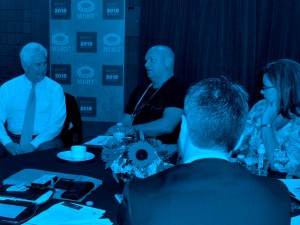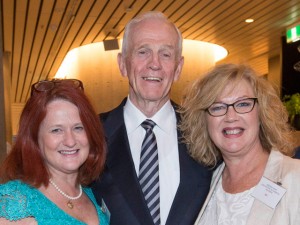Advisers from five countries compared notes at the 2015 MDRT Annual Meeting in New Orleans in June, as they discussed the critical consumer and regulatory issues impacting their advice world. We found that the Australian adviser community is ahead of the curve in some areas of client engagement and advanced regulatory frameworks, but that other countries were much further down the road when it comes to bridging the gap between the financial advice sector and the consumer…

Front row (L-R):
- Michelle Hoskin – Founder – Standards International, United Kingdom
- Kobus Kleyn – Director – Kainos Financial Services, Liberty Group, South Africa
- Peter Sobels – Publisher – riskinfo
- David Braithwaite – Managing Director – Citrus Financial, United Kingdom
- Susan Paterson – MDRT Australia Chair, Director – Business Insurance Group
Back row (L-R):
- Brian Ashe – 2000 MDRT President, Director – Brian Ashe & Associates, Illinois, US
- Warren Stephens – MDRT New Zealand Chair, CEO – Lifetime Group, NZ
- Jenny Brown – Founder, CEO – JBS Financial Strategists, Australia
- Andy Marshall – Head of Sales Strategies & Research, Life Risk – Zurich Financial Services Australia – Sponsor/supporter
- Adam McCann – MDRT Australia Vice Chair, Director – Bartons Financial Services
Client/adviser relationships
The panel, which comprised highly successful advisers and industry contributors from Australia, New Zealand, South Africa, United States and the United Kingdom, was initially challenged by UK best practice specialist, Michelle Hoskin, to share whether they had personally experienced the financial planning process as a client “…because until you do that, you’ve got no idea what it’s like to be a client.”
you’ve got no idea what it’s like to be a client
Michelle related to the panel that, despite her detailed understanding of the financial advice sector in the UK and Canada, when she underwent the advice process as a client, she became confused by it. She also told the panel her advice practice clients always answered ‘no’ to that question, and likened their lack of personal experience as a financial advice client to doctors prescribing their own medicine: “When you speak with your clients, you know the value that comes with asking them questions they’ve never been asked before – and you need to experience that.”
“… when you’re on the receiving end of what it’s like to be a proper client, you can see, ever so clearly, how you can add value to your own advice process for your clients. But so many advisers don’t do that,” said Michelle.
Experienced South African adviser, Kobus Kleyn, told the panel: “Before I came into this industry, I had my own financial advisers – yet I didn’t know whether they were advisers or agents or brokers, which is why South Africa is about to go through a similar process to the UK’s Retail Distribution Review, which will help the client understand who they’re dealing with, what type of advice they’re getting and what disclosure they’re receiving.”
In answer to Michelle’s question, Kobus said: “Yes, I went through that experience and found the same thing. It’s not that easy. So when I started my own advice business I was determined to practice what I preached, by truly understanding the advice process and appreciating the education and awareness my clients needed, as well as understanding exactly what we as advisers offer, and how we offer it.”
“I try not to be too ‘close friends’ with my clients,” continued Kobus. “I know that sounds horrible, but I’ve found my clients appreciate me more if they know I’m there for them as a business partner and confidant and not as a social partner, and we have built relationships accordingly. If you’re too close, you cannot always make the tough calls.”
Australia’s 2013 AFA Adviser of the Year, Jenny Brown, had a different perspective than Kobus. “I’m friends with many of my clients,” she said. “They become clients first, and then we connect on social media to the point where we would meet for lunch or dinner, but not necessarily as ‘best mates’. But I think that strengthens the relationship.”
Adelaide-based adviser and MDRT Australia Vice Chair, Adam McCann, agreed with Jenny, noting: “In terms of client engagement, there are three key elements you seek to establish – like , trust and respect – and those elements need to be mutual, because without good client relationships, you don’t have a business.
we can get caught up in discussions about ‘product’ when it’s actually the relationship with people that’s the key
“If you have those three elements and you can really engage with people and articulate what it is that you deliver, you can win their hearts and minds and then the financial advice process will be a good one for both the consumer and the adviser.”
Adam continued: “There are two parts in the evolution of quality advice – firstly the emotional and relational engagement process, and secondly what follows in terms of the advice itself. I think that at times we can get caught up in discussions about ‘product’ when it’s actually the relationship with people that’s the key.”
In considering whether Kobus and Jenny could both have valid points of view, respected UK adviser, David Braithwaite, noted advisers and their clients are all different. “We all have different personalities; our clients all have different personalities. It just depends on what level of relationship you’ve got… I’m friends with some of my clients, but usually not a close friend. I can have some social contact with them because it works better for both of us. But for others, it wouldn’t. And I think when you’re looking for advice, the key is that what they don’t want is ‘product’. That has been my biggest change in my journey as an adviser.”
“Consumers don’t need ‘the product’. They want what the product does,” continued David, “… and that’s the value we can demonstrate as advisers. For example, the client says ‘I want a pension’. No they don’t! What they want is to know that they’ll be financially okay when they retire. So, let’s look at that and then we’ll fit in with what we need to do to get there. Let’s concentrate on what they need and what they view as value, and it isn’t always product-related,” he said.

Client/adviser education
New Zealand adviser and owner of a large licensee practice, Warren Stephens, was asked his thoughts on why many advisers appear to still consider they are selling products. Warren responded that he believes the fact that some advisers are still ‘selling product’ relates to the need to better educate the adviser around the end result for the consumer and their needs. “It comes down to adviser education and making sure there is a formal compliance and education process they must undertake.”
Warren continued, “Finally, there’s a base regulation that’s being introduced in New Zealand that will make sure there’s a commitment to a competency level. Previously there has been no commitment to formal education for advisers.”
Warren agreed New Zealand was “very much in the transition phase” from product/commodity-based advice to solutions and/or values-based advice. “Historically the manufacturers have been a bit guilty there (product selling),” he said.
In noting a move away from a traditional ‘tied agency’ environment, however, Warren highlighted an unintended consequence in this evolution. “There’s now a big shift away from a tied agency style, where it was pretty much controlled [by the manufacturers], to where now it’s very much an open market where anyone can come along and set up shop without too much compliance or controls around it. And that has led to a ‘brand’ damage to the reputation of the adviser market,” said Warren.
Queensland adviser and Australian MDRT Chair, Susan Paterson, told the panel she believes the Australian adviser market was further progressed on its evolutionary path, and doesn’t think there are many advisers in Australia who remain ‘product sellers’.
“I think most adviser attitudes are very much needs-based approaches to their clients. But I do think there’s a differential between independent financial advisers and bank-aligned advisers, because if they’re in that banking channel they seem to have a more product-based approach,” Susan said.
there are now around 30,000 advisers operating in the UK, down significantly from 280,000 advisers twenty years ago
On the issue of financial advisers who work in the bank channel, Susan questioned David on his opinion about this structure in the United Kingdom. David responded that in the UK “we haven’t really got them anymore”.
Michelle clarified, noting that regulatory change in the UK saw many advisers move to what she termed ‘tied networks’, “so they came out of the independent market, preferring to join an advice network that offered restricted advice, that is, a set panel of products”.
“Bank adviser numbers shrunk dramatically, as they didn’t become restricted advisers,” continued David. “They just left because the banks said they couldn’t offer that type of advice channel.” David said there are now around 30,000 advisers operating in the UK, down significantly from 280,000 advisers twenty years ago. “This is a huge, massive number of advisers who have left the industry,” he said.
2000 MDRT President, US adviser, Brian Ashe, continued the gloomy report on adviser activity and consumer trends. “In the US, we write seven million fewer policies every year than we did 15 to 20 years ago, and yet the number of households with families has increased by 19 per cent during that time.” Brian said he put that trend down to a lack of consumer education. “One of the things we found from the Life Foundation and in studies with LIMRA was that even though the pricing of insurance products has reduced significantly, one of the big issues is education about price, because if you ask consumers, they over-estimate the cost of life insurance by 200 to 300 per cent. So they say, ‘Well, I can’t afford it’, and this becomes a consumer education issue as to how we can convince them that, not only is there a need for it, but it’s within reach. There’s a multitude of solutions that are available to help satisfy that need.”
Zurich Financial Services Australia’s Andy Marshall, shared with the panel that the best advice practices he has seen are the ones that have bridged that gap between product and value “… because in their advice process – and they’ve really looked at the client experience – in that process, they’re linking in with what someone really needs”.
“They’re having the discussion about the client values and connecting with them at that meaningful level. And then the product becomes almost self-selected because of the process that has been taken – because the adviser has done a beautiful job in connecting with the client to work out what’s really important to them. Sometimes that becomes a values discussion and sometimes it involves something different, depending on the client. So that’s what the good businesses do really well – where the quality of the advice becomes a function of the level and quality of the engagement.”
that’s what the good businesses do really well – where the quality of the advice becomes a function of the level and quality of the engagement
Kobus: “In South Africa we operate under the Financial Advisory and Intermediary Services Act. One of the sections in the Act says it doesn’t matter whether you’re advising on risk or investments or anything else – you have to do a financial plan for your client. You can’t even waive doing a plan. Even if the client signs a waiver, you’re still held responsible for your advice.” Kobus also noted that in South Africa, the regulatory process is based on what a client needs, rather than on what a client wants.
Adviser remuneration
Kobus told the panel South Africa has undertaken its own Retail Distribution Review, similar to that conducted in recent years in the United Kingdom. He noted: “We’re going to be the first country to fully do-away with investment commissions and we will operate under a proposed 50 per cent upfront commission for advice on risk products. So, the whole spectrum of advice in South Africa is changing, where you can’t just sell a product unless you’ve done a financial plan, and that’s where the quality of advice to the consumer in South Africa is being lifted.”
Susan queried Kobus on how adviser remuneration for replacement risk policies would operate in future in South Africa. Kobus said South Africa will soon be barring commission on ‘churning’ policies across the board, while internal churning already carries no commission. “If you’re changing companies and switching products, there will be no commissions paid. But you can charge a fee to the client for this service,” replied Kobus. “And clawback provisions remain in place, where the adviser pays back commissions if a policy is cancelled within two years of implementation.”
“Under our proposed RDR,” continued Kobus, “… if we’re going to replace a policy, you can only charge an advice fee; not commission.”
Warren asked how the client would benefit under those circumstances: “Will the insurer reduce the premium for the client on the new policy if they’re not paying a commission?” Warren observed this scenario was “sort of like solving one problem but creating another”.
Kobus agreed, but conceded, “South Africa’s Financial Services Board is steadfast in its resolve. Even if it’s shown that it’s in the best interests of the client to change policies, the FSB says the adviser must rather charge a fee for that service.”
Switching the focus to New Zealand, Warren noted a significant review is under way, where “all the insurers have been asked by the regulator to provide data going back over five years as part of a review into churning etc…”
We would love to see the industry come up with its own response to issues surrounding conflicted advice
“In New Zealand, if there’s a justifiable need to change policies, an NZ adviser is required to complete and submit a replacement business form, which the carriers must retain on their records. And the process must be very transparent,” added Warren, who said he and his peers are awaiting the review outcome, within a regulatory environment where advisers can presently earn up to 230 per cent upfront commission on new life insurance policies, plus another 30 per cent business override from some carriers. “We would love to see the industry come up with its own response to issues surrounding conflicted advice, but it hasn’t happened. So it looks like it will be regulatory intervention,” he said.
In future Warren speculated that procurement (upfront) fees may come down to possibly 100 per cent with 30 per cent ongoing or renewal commission.
Brian noted replacement policy advice notes have been required in the US since the 1970s. But he noted there was a three-way relationship between the product provider, the client and the adviser. He said both the client and insurer were ‘paid’ by way of the client benefiting from a better policy and the insurer from securing a new product sale. Brian conceded he appreciated that the regulators have a point about there not being a financial incentive to replace a life insurance policy. “But if it isn’t churning and the client’s best interests can be justified, how come the only person left out of the transaction is the adviser?”
David told the panel the problem then becomes one where the product [life insurance] still needs to be sold. “People don’t know they should have life insurance. People haven’t got enough of it. And if advisers aren’t paid to ‘spread the word,’ how will the word get spread?”
Brian added: “If you did take the adviser out of the equation and the consumer dealt directly with the life insurance company, why shouldn’t the premium reduce by 40 per cent?”
David offered a scenario where “you can say to the client – the premium will be ‘this much’ and I will be paid by the insurance company’s commission. Or, you can have a reduced premium and you can pay me a fee. Which one do you want?” He noted: “That’s being transparent; that’s being fair; that’s being honest. That would be a good way of doing it.”

Kobus said one of the biggest issues in South Africa was what he referred to as ‘sign-up bonuses’. “We have 113,000 general advisers and intermediaries and there are about 41,000 long term insurance advisers/financial planning advisers, and a lot of those are ‘tied’ advisers… companies were offering millions to sign these advisers from other firms, and what then happened was simply churning policies.” Kobus said the companies were buying advisers because they didn’t want to go to the expense of educating and training new entrants.
“But from 2015, sign-on bonuses have been banned,” added Kobus.
The consumer education challenge
Commenting on US consumer education, Brian said the former US Institute of Life Insurance was funded by life companies and designed to educate consumers about all things life insurance. But he said the companies ceased funding the Institute in favour of political lobbying, to achieve their agenda via legislation instead of engaging with the consumer. “And the result of that was a drop-off in consumer education and financial literacy in general,” said Brian.
It’s very difficult to move that dial on public opinion
Taking matters into its own hands, the US adviser community formed the Life Foundation (now Life Happens) in 1994. “Around that time,” Brian said, “…we had this fall-off of five or six companies who had failed. And following the origination of universal life products, where interest rates, which had been high at the time the policies were issued, dropped off, and performance began to fail, there was this big negative perception about companies, the producers and the products, that needed to be addressed.
“So the field organisations of this country came up with the initial funding for the Life Foundation and then approached the insurers for additional funds to carry an independent message about term insurance, permanent insurance and financial planning to the consumer.
“We’ve now been around for 21 years. It’s very difficult to move that dial on public opinion, but we believe we’ve begun to move it just a little bit,” Brian said.
Through its various initiatives, both new and existing, Brian told the panel he was hopeful that from a consumer literacy and consumer education stand-point, this will increase not only the ability of the insurer, but also the ability of the individual adviser, to reach out to their clients and provide them with relevant information very quickly; information that is applicable to their circumstances and to the solution being developed for them by the adviser.
Responding to a question from Michelle, Brian confirmed the message and processes developed for the Life Happens organisation could be replicated elsewhere in the world. “It’s only in US at the moment, but it is transferable to other countries,” said Brian.
Jenny noted that in Australia, the corporate regulator, ASIC, continues to conduct financial literacy campaigns (see: MoneySmart), “and it receives support from both consumer and adviser groups”. Jenny also noted the ‘Your Best Interests’ campaign currently being run by the Association of Financial Advisers (AFA).
She added that consumer education initiatives in Australia are ‘association-driven’ at the moment (AFA, FPA), rather than being driven by the broader life insurance and financial services industry “Of the roughly 20 per cent of Australians who seek advice, most of those believe in the value of the advice they receive. But it’s the 80 per cent who don’t seek advice who we’re trying to reach and to turn around their perception about the value of advice,” she said.
Of concern to the entire panel was that efforts at enhancing consumer financial literacy were dis-jointed and dis-connected. The panel was generally disappointed that the financial services industry has not been able to unite to address this issue.
Susan: “If everyone in the industry put money into this cause – if everyone shared the financial burden, then the pool of advice services would become bigger and everyone would benefit by the growth in the advice pool. … as advisers, we all believe strongly in what we do and have a passion for what we do.”
Michelle agreed with Susan’s sentiment, adding, “But the carriers should at some level have that same belief and passion. I think they’ve forgotten about the fundamental reason they’re in business.”
Warren characterised consumer education in New Zealand as “very much under-done”. He said what consumer education existed was mostly led by the NZ Government.
“There’s a fantastic consumer education website in New Zealand, called ‘Sorted’ (The Kiwi Guide to Money). It’s been created by the Government, but the challenge for both the industry and the Government is to find a way to drive consumers to the site,” said Warrren.
as an industry, we need to deliver a voice that is united, so that we can get a consistent message out there that helps to develop that trust
On the other side of the equation, said Warren, there are also direct insurance ads in mass media offering attractive discounts, eg: 20 – 30 per cent off first year premium, which looks attractive to the consumer. “So there’s a conflict between the direct insurance message and the need for quality advice promoted by Sorted,” he cautioned.
“While there’s a place for the direct insurance message, as an industry, we need to deliver a voice that is united, so that we can get a consistent message out there that helps to develop that trust, and so that consumers can understand what the adviser does, so we can build their confidence to a level where we they’re happy to speak with an adviser.”
Adam also lamented the lack of consumer literacy that can exist in Australia, including a lack of education among many highly-educated professionals. He gave an example to the panel from his own practice, where medical specialists represent one of his key client segments, and where their degree of financial literacy is less sophisticated than might be expected.
Adam strongly believes that one answer could lie in the official school curriculum. “We need to get fundamental financial education into the school environment … we need to equip our youth for life,” he said. “Most of them are going to enter the workforce. They’re going to need money to buy a house; they’ll need to be insured as needed, and know about cash flow and budgeting. I see a lot of professionals who are financially out of control. They’re earning excellent incomes but most of it is being spent. The issue isn’t income, but spending.”
“They lack those basic financial skills that could be taught within the school system. At an educational level, that grounding would make an enormous difference,” stressed Adam, whose point was strongly supported by the panel.
Turning to the UK, Michelle and David painted a very gloomy picture of the level of consumer literacy initiatives in that country. “The UK does nothing at all,” was Michelle’s brief and damning assessment.
“The market in the UK is shifting to advisers wanting to work with high net worth individuals and these individuals probably don’t need much life insurance because they already have so much flippin’ money.
“I suggest advisers with this proposition offer client seminars for the children of their clients in order to develop an intergenerational structure to their business.
“We’ve also got a generational issue because the generation of today is living for today – they don’t think they’re going to die… so why would they worry about dying and having life insurance? But the UK is doing nothing to educate anybody,” said Michelle.
David noted the UK’s Personal Finance Society “… ran a great conference years ago, which used to attract maybe 3,000 people. It now has around 400 attend – and they’re doing the conference regionally”..
“They used to be great advocates for the value of advice. And we have MDRT in the UK doing what we can to promote consumer education in the country, but it’s very difficult to motivate sufficient people to make a genuine difference,” David continued.
“The manufacturers provide tools for us, as advisers, but it’s left up to us to educate the consumer. What we’re finding now in the UK is that advisers are doing more themselves to take up the role of educating their client, such as using podcasts and creating our own TV channels. We’re doing it on our own, using the tools that we can find which, frankly, are sparse. There isn’t really anything there for us, but it’s come down to us having to do it.”
Michelle felt MDRT had a capacity, in a global sense, to make a difference in consumer education, and this represented a massive opportunity for the organisation, not just as an association for advisers, but also as an education organisation for consumers.
For that week, your time as an adviser is dedicated to presenting and talking about financial advice
On a much more positive note, Kobus shared with the panel the activities undertaken by South Africa’s Financial Planning Institute, which is a professional association. “…we have 4,200 Certified Financial Planners that belong to the FPI. They have incredible ‘Financial Planning Weeks’ and it’s in the media and all over the place,” said Kobus. He said each of the 4,200 CFP adviser members must offer, as part of their membership requirements, at least one week’s pro bono services to the public. “We go to shopping centres and schools; we’re in the newspapers; we’re on the radio; we’re on social media and we do it purely on a voluntary, pro bono basis. For that week, your time as an adviser is dedicated to presenting and talking about financial advice, as and when required, if you offered your services as a volunteer.”
Kobus noted the success of this grass roots campaign can be seen in the record sales being experienced by South Africa’s five largest insurance manufacturers. “Our economy is down – it’s depressed, so it’s really about awareness. [The record sales] are not about a quick sales spike. I’ve been involved in this every year for 15 years. I’ve stood in shopping centres, churches and even schools and that’s where it started.” Echoing Adam’s earlier comment, Kobus said, “it started with school education… and I believe ‘awareness’ is the answer.”
He said the initial engagement in the FPI initiative took at least three to four years before any additional take-up was evident. “It’s a process, not a project,” he emphasised.
By contrast, Michelle noted that the majority of the UK financial advising marketplace do very little to support Financial Planning Week in the United Kingdom, conducted by the country’s Institute of Financial Planning.
Brian said Life Happens in the US conducts three annual campaigns:
- Life Insurance Awareness Month (September)
- Insure Your Love (commences around Valentine’s Day)
- Disability Awareness Month (usually in May)
“Not only do you get an increased response from consumers because of increased awareness, you also get enhanced awareness from the adviser, for whom these annual campaigns are reminders of why they are in this business,” Brian said.
Focusing on education in schools, Brian directed the panel to the Life Happens program called Next Generation, which links with the National Educators Association. “… we provide free programs, all digitised, with teaching plans all laid out, that they can use with classroom formats and if they want advisers come in on a pro bono basis, to explain terminology or personal experiences, they can do so.
we’re trying to educate the wrong end of the age spectrum
“Through this we have had somewhere in the region of 40 million kids exposed to this program, and the belief was that if you get high school kids exposed to this message in the next seven to eight years of their lives, they will develop familiarity with the terminologies; they will remember the information they were given and hopefully they will be more disposed to receive the [financial advice and financial literacy] message.”
Michelle reinforced the general thinking around the table that “…we’re trying to educate the wrong end of the age spectrum and we should be focussing on younger teenagers and adults.” Both Michelle and Jenny recalled specific campaigns from their youth in the UK and Australia, where the banks promoted financial savings programs for young children (eg: the Australian ‘Dollarmite’ campaign) but which no longer appear to have engagement.
Life insurance advice fees?
In a final question, particularly in reference to current events in Australia, we asked whether the panel could envisage a future where the consumer is generally prepared to pay a fee for the provision of life insurance advice solutions.

David: “We’re starting to offer that option in our practice. We look … beyond the [life insurance] product itself and ask what you want the product to do. You want it to pay out to your loved ones.” David said his firm has set up a trust company for the purpose of managing the intent of his clients’ life insurance and other protection policies. “So, we’re doing the job of providing life insurance. But if the client wants it to go here [into a trust], then we provide a wrap for the work at the back end and charge for that. We’re just thinking differently,” he said.
David believes a risk-specialist practice could definitely operate under this style of fee model, but added: “The issue is we risk alienating the very people who really need this advice… but can’t afford to pay the fee. And that’s where we’ve got a problem coming.”
Susan reinforced the point being made by David, in saying she believed that if the client was a business, they would look to pay a fee for more complex life insurance-related advice services, but “…the person who’s going to end up suffering is the person who needs insurance the most”.
“They are the people who earn less and are often the ones in the lower socio-economic groups who also have health issues and these are the people who are just going to keep falling through the cracks,” said Susan.
I don’t think the average consumer will pay a fee at a level that would appropriately compensate the advice business
Andy said a fee-based approach to life insurance advice wouldn’t work without a wholesale life insurance ‘stripped down’ pricing mechanism, where insurers can offer a completely ‘raw’ product. He added a life insurance advice fee would not work without adjunct or additional services that can be packaged into the proposition, such as estate planning.
“Yes, the business owners and high net worth clients might potentially pay a fee. But I don’t think the average consumer will pay a fee at a level that would appropriately compensate the advice business,” said Andy.
Andy referenced earlier research that found a consumer didn’t value an entire financial plan at any more than around AUS$300, when it cost AUS$3,000 for the adviser to produce it. “So if you’re talking about insurance only, will the consumer pay AUS$2,000, AUS$2,500 for that advice, when potentially they may not get a product solution at the end of the process?” he asked.
Adam agreed that taking a prospective client through a process that looks at their mortality and asks them to pay a fee when they may not receive a policy, would need a paradigm change.
He agreed the educated and mostly high net worth consumer may go down that path, “but the people who need this advice the most will miss out”. He added, “[In Australia] we’ve got a chronic underinsurance problem and I can actually see it becoming worse; not better.”
Jenny agreed with the panel: “If you offer holistic advice, it’s generally easier to be able to package-in insurance as part of the fee. Whenever we’ve charged fees for life insurance advice, it’s been wrapped up with other advice services , such as budgeting and cash flow and retirement planning.”
Warren concurred. He believes charging a fee for risk advice services has the potential to do more harm than good. “I just can’t understand how you can have a relationship with your client and say, ‘This is a $2,000 service. You don’t have $2,000? Well, we’ll put it in the product.’ Isn’t that just commission? It just doesn’t make any sense.”
Brian invoked an Oscar Wilde comment, quoting: “‘People know the cost of everything and the value of nothing’. And that’s one of the problems associated with fees in this area. We’ve had the cost of life insurance in the US decrease by 60 per cent over the least 15 or 20 years and yet people are buying less of it than they did before. So it isn’t necessarily a matter of the cost.”
Another dangerous area Brian highlighted was what he referred to as “a race to the bottom”, when people charge fees against competition. “Who’s going to charge the lowest fee? And then quality starts going down, and then you have competition that may not be based on the best advice or the best product, but on what’s the lowest fee.”
Kobus: “I honestly believe the consumer will be willing to pay. But in our case, we’re going to be forced to test that theory very soon, with a reduced commission of 50 per cent upfront for risk products. The outcome will depend on how the Financial Services Board structure their collection of these fees – and that is a key aspect.” According to Kobus, the fee to the client will be collected on the adviser’s behalf by the carriers (Financial Service Providers) at the same time as the premium collections, but the success of this system is yet to be proven.
Michelle: “I think we’re fighting a losing battle because you can buy life insurance in the UK supermarket if you want. Some of us want to put ‘insurance’ into the ‘financial planning’ box – we want it to be part of that, and it just isn’t seen that way.”
Asked how the risk-specialist adviser can demonstrate the value of their advice when consumers can buy their life insurance from a supermarket check-out, Michelle said, “I don’t think they can.” But she continued, “if you package that advice with planning and investments, then yes, absolutely the client would pay for it.”
Michelle also noted an issue she believes exist with UK employers. “They can actually do quite a bit more.” In noting UK employers must offer every member of staff a pension, Michelle said “they ought to make it mandatory to also include life cover as part of any employee’s package.”
Final words
Adam McCann: Adam took the opportunity to make a final point about how consumers pay for life insurance advice. “Regarding the underinsurance gap, one of my biggest concerns is that some clients struggle with the concept of a fee when it comes to insurance. If fees are built into the premium the client often accepts it more readily. But if it there’s a premium plus a fee, they may avoid proceeding with cover, leaving them underinsured and potentially vulnerable in the event of a significant health event.”
Andy Marshall: “From an insurance provider’s point of view, we have done an inadequate job of educating the consumer. We’ve done too much in talking about what life insurance is, and haven’t talked enough about what life insurance does. What it does is provide peace of mind and freedom and with that peace of mind and freedom you can have better life experiences. And that’s the conversation we need to be having as an insurance provider – to help educate advisers’ clients to highlight what the value of advice is. And if we can do that really well, then perhaps we can have people coming through our portal to advisers.”
Susan Paterson thanked all the panellists for their involvement and added, “I just love what we do and all the reasons why we do it… But my concern is that regulatory and industry changes won’t necessarily deliver a better outcome for the consumer. These changes are making the ‘deliverable’ to the consumer more complicated, not easier. I feel it almost needs to be stripped back.
David Braithwaite: “[In looking to the future] We’ve got to focus on advice and value; not product. You have to package up a service proposition that you believe in. You can’t just copy someone else. You’ve got to do it yourself. We as advisers must be willing to change in the first place. If you’re not willing to change, nothing will change.”
Michelle Hoskin told the panel she experienced a ‘light-bulb’ moment during the discussion. “I have a lot of contact with consumer bodies and I’ll meet with them when I get home,” said Michelle, adding that she can envisage a future where there exists the possibility of a co-ordinated and global message about the value of life insurance and financial advice and about consumer education.
Michelle told the panel she will seek to create a conference for consumers with the intentions of raising awareness, educating and significantly changing the perceptions around financial planning.
blending artificial intelligence with human intelligence would be great, as long as it still has a soul
Kobus Kleyn: “We need to evolve from an industry into a profession.” Kobus cited the example of clients going to see a doctor or lawyer. “Do you approach them, or do they approach you?” he asked. He added that while it may take another twenty years or possibly another one or two generations, once the consumer views the financial adviser the same way they view a doctor or layer, then the adviser can charge whatever fee the professional should fairly charge, and the consumer will always be happy to pay it, as there will be a value proposition to pay for.
Brian Ashe: “I would agree with the general sentiment of the panel that there is a necessity to provide value and to provide consumer education.” Brian raised the issue of the emergence of robo advice, quoting a recent article suggesting life insurance advisers might be entirely replaced by robo advice as an inevitable next stage in using technology. “I don’t think that will happen,” he said, adding that in an article he recently wrote, he said blending artificial intelligence with human intelligence would be great, as long as it still has a soul.
“And that’s the argument about why there will always be a need for ‘human’ advice – you have to have relationships with people. And they have to be educated as to what the products do, not just what they are. Otherwise, everything that we do can be commoditised,” warned Brian.
Warren Stephens: “It’s our responsibility to be the voice of the industry – and make sure that the industry has a voice with the regulators in our countries.
“The social impact of not enough people having life insurance is far-reaching and we have a responsibility to have a voice in managing the change that is coming.” He did not advocate change for change’s sake. “[The system] is not necessarily broken – we just need to manage it better.”
Warren was effectively challenging himself and his peers to take on the mantle of responsibility in New Zealand to educate the consumer, such as undertaking pro bono work – every adviser in New Zealand, for one week in the year, along the lines of the South African model outlined earlier by Kobus.
Jenny Brown: “You need to take on board what is changing – and deal with it and work out the best way forward… I’m certainly concerned, especially for some of the younger advisers looking to enter the industry with the proposed changes to insurance commissions in Australia.” Unless younger entrants can start their careers through the bank channels, Jenny is concerned that it will become too difficult for the life insurance profession to attract the next generation of advisers. “For established businesses – we’ll mostly be fine, but not the younger, newer advisers. And we may lose many advisers who already operate,” warned Jenny in closing…














